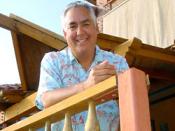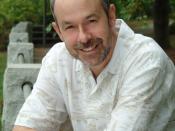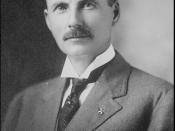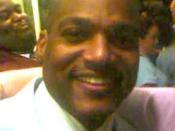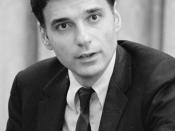Ralph's true nature is to be rational. In the novel, The Lord of the Flies, Ralph has many ideas, leadership skills, and a force to create a better place and try to get the boys home. "There's another thing. We can help them to find us. If a ship comes near the island they may not notice us. So we must make smoke on top of the mountain. We must make a fire, " Ralph states. The previous quote illustrates one of Ralph's many rational ideas. While the other boys wander off to enjoy the enchantments of the island, Ralph builds the shelters. Ralph is able to think logically about the most important tasks that need to be done. In chapter five he sets up five rules for the boys to follow. These rules are: everyone must sleep in the shelters, use the rocks beyond the bathing pool as a lavatory, always keep the fire gong, make fire only on the mountain, and follow all the established rules.
These rules show a boy capable of accomplishing the most important business, rather than just having fun. Earlier in the novel, it is discovered that Ralph is literal. "You couldn't light them. They just look like candles,"� Ralph remarks about the bushes. It is shown that Ralph takes things on a literal basis, but still has an imagination. Golding portrays Ralph as logical and the ego of the boys on the island.
While Ralph fights to maintain order, Jack seduces him to join the id. While hunting with Jack, Ralph strikes a boar. He becomes full of pride. Hunting: what Ralph once viewed as degrading and worthless, he now finds enjoyment in. "Ralph, carried away by a sudden thick excitement, grabbed Eric's spear and jabbed at Robert with it,"� illustrates the sudden urge that has come upon Ralph. Jack's behavior has started to influence Ralph. On a more serious level, Ralph even takes part in the death of Simon. "And look, Ralph don't let on we was in that dance,"� Piggy suggests to Ralph. The fact that Piggy uses "we"� proves that Ralph was involved. Another factor that illustrates Jack's influence is that Ralph can no longer remember his rational ideas. "Ralph tried indignantly to remember. There was something good about a fire. Something overwhelmingly good,"� Greene states to express Ralph becoming overwhelmed by the id. His memory fails to recall the importance of structured ideas. Jack is portrayed as the id of the boys. His goal is to destroy the ego (Ralph). His pressure over Ralph becomes extreme at many times. However, he does not overcome Ralph.
Ralph refuses to let Jack change him. Ralph separating from Jack and the other boys show that he will not be a part of the id. "Well, we won't be painted, because we aren't savages,"� Ralph announces. The paint was a mask that would let them enter the world of the savages. Wearing paint would mean that Ralph had accepted to enter the id. Thus, while refusing the paint, Ralph refuses to descend into the id. At castle rock, Ralph approaches Jack with a plan. This proves that Ralph has remained organized and rational. "The fools! The fools! The fire must be almost at the fruit trees- what would they eat tomorrow?"� asks Ralph. Even at the end Ralph stills evaluates the boys' situation. His rational mind makes him think for the future and the well being of the others. "A little boy who wore the remains of an extraordinary black cap on his red hair and who carried the remains of a pair of spectacles at his waist [Jack], started forward, then changed his mind and stood still,"� writes Golding. This illustrates that the id was forced to remain back. In the end, Ralph overpowers Jack.
